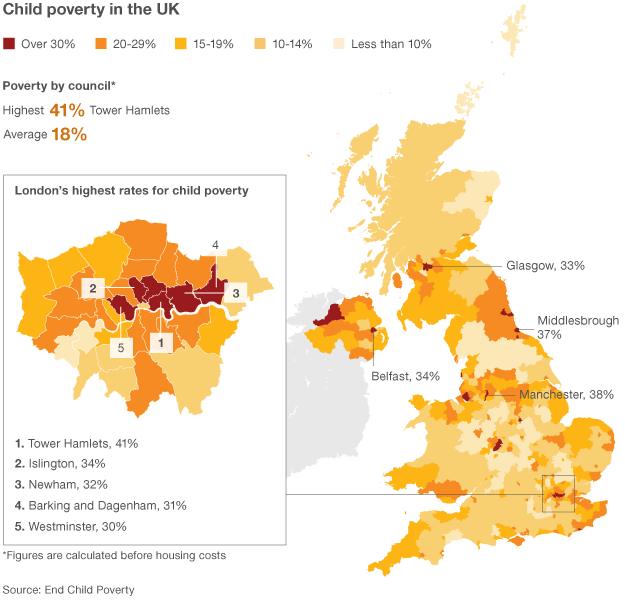Alan Milburn says child poverty 'no longer problem of the workless and work-shy'
- Published
- comments
Social mobility tsar Alan Milburn said his report shows "work is not a cure for poverty"
Working parents in Britain "simply do not earn enough to escape poverty", the government's social mobility tsar Alan Milburn has warned.
Two-thirds of poor children are now from families where an adult works, his report found., external
Many low and middle-income children face being "worse off" than their parents because of falling earnings and rising prices, Mr Milburn added.
Wealthier pensioners' benefits should be cut and minimum pay raised, he said.
The former Labour health secretary suggested some benefits currently protected from cuts - such as free TV licences and winter fuel allowances for pensioners - could be means tested in order to share the burden of austerity more fairly.
But a spokesman for David Cameron said: "The prime minister believes it is right to make commitments to pensioners in relationship to state provision."
The government has pledged to safeguard such benefits until the next general election.
'Fairness deficit'
In its first report, the government's Social Mobility and Child Poverty Commission warned the target of ending child poverty by 2020 would "in all likelihood be missed by a considerable margin" - leaving as many as two million children in poverty.
Poverty is defined as having a household income that is less than 60% of the national median income.
The latest government figures on poverty, external, released in June, show the median UK household income for 2011/2012 was £427 a week - 60% of that figure was £256 a week.
In that year, 17% of children, or 2.3 million, were classed as being in poverty while 15% of working-age adults, or 5.6 million, were in poverty.
For pensioners, meanwhile, that figures was 16% - or 1.9 million.
The report said Britain still had "high levels of child poverty and low levels of social mobility" with a rising number of children in "absolute poverty" coming from working families.
Two thirds of children officially deemed as being poor now came from a family where at least one parent was working - and in three out of four of those cases, at least one of their parents was working full time, the report found.
It also said the "twin problems of high youth unemployment and falling living standards" were storing up problems for the future.
Among its key recommendations the report urged the government to:
End long-term youth unemployment by increasing learning and earning opportunities
Reduce in-work poverty by asking the Low Pay Commission to deliver a higher minimum wage
Reallocate childcare funding from higher rate taxpayers to help those on Universal Credit
"Just as the UK government has focused on reducing the country's financial deficit it now needs to redouble its efforts to reduce our country's fairness deficit," the report said.
'Sharing the burden'
Single mother Judith Healy, who works from home as a telemarketer, said that, while her wages had not gone up, her expenses had continued to increase.
Judith Healy: "I watch the pennies just slipping away"
She said she was worried about paying energy bills this winter.
"We didn't ask to get in this situation, we are doing the best that we can in the circumstances that we have and that's really what it's about - it's survival now," she told BBC News.
Mr Milburn told the BBC: "Today child poverty is a problem for working families rather than the workless or the work-shy."
Around five million people in the country, mainly women, were earning less than the living wage, which is about £7.45 an hour outside of London, he said.
"These are the people frankly who do all the right things, they go out to work, they stand on their own two feet, they look after their families - they're the strivers not the shirkers - and yet they're all too often the forgotten people of Britain and I think they desperately need a new deal."
Mr Milburn said that while ministers and employers could do more, it was unrealistic to expect the government to continue topping up low pay using working tax credits.
He advocated a scheme for pairing bright children with the best teachers in an effort to raise attainment.
Mr Milburn has previously said social mobility - the idea that individuals can better themselves in terms of educational opportunity, job prospects and salaries from one generation to the next - is "flat-lining".
Writing in the Daily Telegraph, external, Deputy Prime Minister Nick Clegg welcomed the report, but warned that "punishing pensioners isn't going to help a single child achieve more in life".
Enver Solomon, of the National Children's Bureau charity, said the report was "a wake-up call for all political parties by stating that our country is dramatically polarised between the haves and have- nots".
"As the commission states, there is an urgent need to rebalance the distribution of resources so that the burden of austerity is more equally shared," he said.
Shadow work and pensions secretary Rachel Reeves said the "powerful report" showed "ordinary families' living standards [were being] squeezed and social divisions [were] deepening as a result of this government's decisions to put a privileged few first".
On Wednesday, figures from the Office for National Statistics, external (ONS) revealed the number of unemployed people in the UK fell by 18,000 to 2.49 million in the June-August period.

- Published17 October 2013
- Published17 October 2013
- Published17 October 2013
- Published17 October 2013
- Published16 October 2013
- Published18 September 2013
- Published24 June 2013
- Published17 June 2013
- Published30 May 2012
- Published5 June 2013
- Published11 July 2012